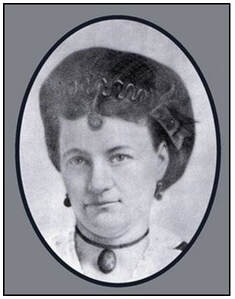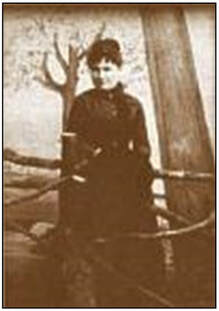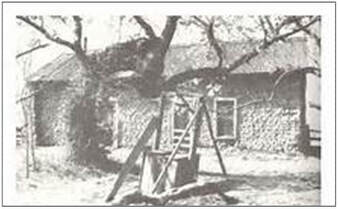Cowboy Capital of the Panhandle
By Glynda Pflug

A couple of names from the late 1880's stand out in the history of the area -- Old Tascosa and Frenchy McCormick
Old Tascosa was sometimes called "The Cowboy Capital of the Panhandle." It became a major stopping place for cattle drives headed north. Cowboys, ranchers and outlaws were equally welcome. The town was located in Oldham County on land that is now Boys Ranch.
The town became the wildest town in the west at the time. Gunfights were common and as many as 26-30 men were murdered or died in the fights. Tascosa had all the places associated with the West, gambling houses, saloons, dance hall girls and prostitutes.
Some of the famous men of the West were in and out of Tascosa -- Billy the Kid, Pat Garrett, Charles Goodnight and Arkansas Dave Rudabaugh, Charles Siringo and Dr. Henry Hoyt. Hoyt and Billy the Kid became close friends. Later Hoyt became Surgeon General of the United States.
At one time Temple Houston, son of Sam Houston, was in Tascosa and he and Billy set up a shooting competition, which Houston won.
Mickey McCormick was an Irish gambler who set up a livery stable in Tascosa. His main passion was gambling and he set up a gambling hall behind a saloon. On a trip to gamble in Mobeetie, he met a young, petite, blue-eyed, black-haired saloon girl named Frenchy.
Old Tascosa was sometimes called "The Cowboy Capital of the Panhandle." It became a major stopping place for cattle drives headed north. Cowboys, ranchers and outlaws were equally welcome. The town was located in Oldham County on land that is now Boys Ranch.
The town became the wildest town in the west at the time. Gunfights were common and as many as 26-30 men were murdered or died in the fights. Tascosa had all the places associated with the West, gambling houses, saloons, dance hall girls and prostitutes.
Some of the famous men of the West were in and out of Tascosa -- Billy the Kid, Pat Garrett, Charles Goodnight and Arkansas Dave Rudabaugh, Charles Siringo and Dr. Henry Hoyt. Hoyt and Billy the Kid became close friends. Later Hoyt became Surgeon General of the United States.
At one time Temple Houston, son of Sam Houston, was in Tascosa and he and Billy set up a shooting competition, which Houston won.
Mickey McCormick was an Irish gambler who set up a livery stable in Tascosa. His main passion was gambling and he set up a gambling hall behind a saloon. On a trip to gamble in Mobeetie, he met a young, petite, blue-eyed, black-haired saloon girl named Frenchy.

Frenchy was born in Louisiana, but refused to tell anything about herself. It was thought her name was Elizabeth McGraw. She was well educated, but left home as a teenager to perform on the burlesque stage in St. Louis. She became known as Frenchy when she worked in Dodge City and a cowboy gave her the name because she could speak French. She would never tell why she left home or anything about her background. She was happy with the name Frenchy.
Mickey swore he always won and won big with Frenchy by his side. She went back to Tascosa with him and they set up residence. Mickey built them a two-room house of adobe on the banks of the Atascosa Creek.
When Frenchy arrived at Tascosa, there were only three white women in the Panhandle... Mrs. Charles Goodnight, Miss Lizzie Rinehart and Mrs. Tom Bugby. She was a dealer in Mickey's gambling house and soon became the reigning queen of Tascosa.
When the railroad bypassed Tascosa in 1887, the town began to slowly die, but Frenchy and Mickey continued to live in their little adobe house. Mickey was an avid hunter and Frenchy loved to garden, so they had plenty of food.
In 1893, the Canadian River flooded taking out the bridge into Tascosa. Seventeen homes and businesses were washed away. They were never rebuilt.
In October of 1912, Mickey arose and walked to the doorway as normal. A little later Frenchy found him laying on their bed. She asked if the needed a drink of water. When she returned from the kitchen, he had died.
Mickey swore he always won and won big with Frenchy by his side. She went back to Tascosa with him and they set up residence. Mickey built them a two-room house of adobe on the banks of the Atascosa Creek.
When Frenchy arrived at Tascosa, there were only three white women in the Panhandle... Mrs. Charles Goodnight, Miss Lizzie Rinehart and Mrs. Tom Bugby. She was a dealer in Mickey's gambling house and soon became the reigning queen of Tascosa.
When the railroad bypassed Tascosa in 1887, the town began to slowly die, but Frenchy and Mickey continued to live in their little adobe house. Mickey was an avid hunter and Frenchy loved to garden, so they had plenty of food.
In 1893, the Canadian River flooded taking out the bridge into Tascosa. Seventeen homes and businesses were washed away. They were never rebuilt.
In October of 1912, Mickey arose and walked to the doorway as normal. A little later Frenchy found him laying on their bed. She asked if the needed a drink of water. When she returned from the kitchen, he had died.
 Home of Mickey and Frenchy McCormick
Home of Mickey and Frenchy McCormick
Mickey was buried in Casimiro Romero Cemetery about a half-mile east of the McCormick home. From her home, Frenchy could see the grave. She visited it daily and would sit and talk to Mickey. It has been said their love and devotion was the thing legends are made of.
Frenchy became a legend, not only to the Panhandle, but across the West and was interviewed by several newspapers. One story brought two sisters to Tascosa thinking Frenchy might be their long lost aunt. Frenchy would never say if they were related.
As the last of the residents moved, Frenchy refused to leave. She remained until 1939 when she was forced to leave because of ill health. She moved to Channing to live with friends, the Blackwells. She died January 12, 1941 from pneumonia at age 88 -- the last of the girls of the Golden West.
In a story from the Amarillo Globe News, "she was buried next to her "Mack" while some 50 persons stood in sleet and rain to pay their last respects to a dance hall girl, gambler's wife, woman of devotion and mystery -- the last link with Old Tascosa, maverick town of the Panhandle."
Compiled from:
All Things Texas by John Mowery
Old Tascosa: Wildest Town in the West by German Jack Fordem
Texas State Historical Association
Amarillo Globe News story by Fritz Thompson
Archives at Window on the Plains Museum
Frenchy became a legend, not only to the Panhandle, but across the West and was interviewed by several newspapers. One story brought two sisters to Tascosa thinking Frenchy might be their long lost aunt. Frenchy would never say if they were related.
As the last of the residents moved, Frenchy refused to leave. She remained until 1939 when she was forced to leave because of ill health. She moved to Channing to live with friends, the Blackwells. She died January 12, 1941 from pneumonia at age 88 -- the last of the girls of the Golden West.
In a story from the Amarillo Globe News, "she was buried next to her "Mack" while some 50 persons stood in sleet and rain to pay their last respects to a dance hall girl, gambler's wife, woman of devotion and mystery -- the last link with Old Tascosa, maverick town of the Panhandle."
Compiled from:
All Things Texas by John Mowery
Old Tascosa: Wildest Town in the West by German Jack Fordem
Texas State Historical Association
Amarillo Globe News story by Fritz Thompson
Archives at Window on the Plains Museum